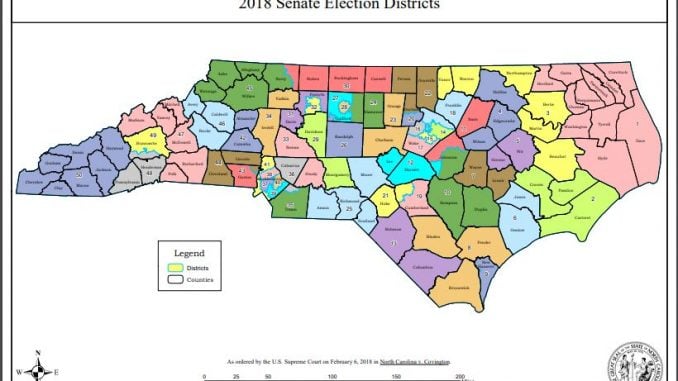
RALEIGH – In the wake of years-long court battles about the level of partisan influence on North Carolina election maps, members of both parties proposed a bill last week to completely overhaul the manner in which the maps are drawn. Reps. Chuck McGrady (R-Henderson), Robert Reives (D-Durham), Jon Hardister (R-Guilford) and Brian Turner (D-Buncombe), the four primary sponsors, held a press conference to announce the legislation.
“The question I have for the people who don’t support this effort, is, ‘Why?’” said Turner at the press conference. “What is it about independent redistricting that scares you? Why would you stand in the way of returning a sense of fairness and confidence in our elections?”
House Bill 69 would still require the final maps to be approved by the legislature in an up-or-down vote, but the process that produces the maps would be in the hands of an 11-member “citizens commission.” Supporters of the bill say the commission would take partisanship out of the process and would ensure transparency and public participation.
The 11 members would be selected by giving the president pro tem of the Senate, the minority leader of the Senate, the speaker of the House and the minority leader of the House each 10 partisan and three nonpartisan picks. A random process would then select four of these nominees from the majority party, four from the second largest party and three from outside those two parties.
Despite two of the four primary sponsors being Republican, most of the other legislators who have decided to cosponsor the bill are Democrats. In comments to WUNC’s Jeff Tiberii, Speaker TIm Moore (R-Cleveland) expressed his doubt that there are any experts on the topic who do not also hold strong views that would influence the process.
“Are we thinking that we’re going to locate folks on this redistricting commission who are knowledgeable and interested in legislative redistricting but don’t have a political agenda? What kind of political science class is that?” Moore said.
Common Cause North Carolina, a group with a mission to “end gerrymandering now,” came out in favor of the bill, according to a statement.
“Gerrymandering undermines the fundamental principles of American democracy by depriving voters of a voice in who represents them,” said executive director of Common Cause NC, Bob Phillips. “This bill is a big step forward in respecting the rights of North Carolina citizens.”
The bill directs the commission to draw maps for the NC House, the NC Senate and North Carolina’s U.S. congressional districts starting in 2021 after the new census results. McGrady said that maybe the uncertainty around this period would open a brief window where both parties would be motivated to act.
“Two years from now, after we have a census, we’re going to have to go back through the redistricting process,” said McGrady at the press conference. “And therefore at a time when neither the Republicans are sure they’re going to be in charge nor the Democrats are sure they’re going to be in charge, may be the time that both sides come together and say we prefer to have nonpartisan redistricting.”
After being read in, HB 69 was sent to the House Committee on Redistricting, where, if given a favorable report, it would then be sent to the House Rules Committee.



